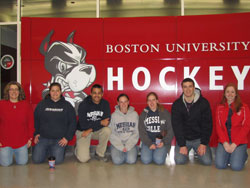Rest for the weary
 On April 18, more than 27,000 runners and nearly a half million spectators flooded the streets of Boston for the annual Boston Marathon. The race, which at the ripe old age of 115 is the world’s oldest marathon, winds through (and up and down) the greater Boston area before coming to a climatic finish at Copley Square. This year, five students and one professor from Messiah College were among the team of medical professionals available to weary runners as they crossed the finish line.
On April 18, more than 27,000 runners and nearly a half million spectators flooded the streets of Boston for the annual Boston Marathon. The race, which at the ripe old age of 115 is the world’s oldest marathon, winds through (and up and down) the greater Boston area before coming to a climatic finish at Copley Square. This year, five students and one professor from Messiah College were among the team of medical professionals available to weary runners as they crossed the finish line.
Wendy Cheesman, senior lecturer in health and human performance, has volunteered at about a dozen Boston Marathons. She takes a small group of students with her so they can witness the magnitude of what is not only a huge sporting event but also “an incredible medical event,” Cheesman notes. Students work at the finish area, providing wheelchair assistance to exhausted, dehydrated runners, and help in the block-long medical tent where doctors, nurses, athletic trainers, and physical therapists work together seamlessly to assure the recovery of every runner.
Due to hectic spring schedules, the cost of the trip, and other logistics, Cheesman stopped volunteering at Boston a few years ago. This year, Brian Fitzgerald, head of the athletic training staff for the marathon, inquired about Messiah’s absence, and encouraged Cheesman and her students to return to the event. Fitzgerald recognized the competent, compassionate way that students attended to the athletes and treated the other medical staff. Messiah was one of 17 athletic training programs represented among the 80 total athletic trainers at the event.
Seniors Jason Besse, Rachel Green, Shane Leahy, Stacey Matson and Kelsey Voigt accompanied Cheesman to this year’s race. It was a long day for all involved—medical tent set-up starts at 7 a.m. and it takes hours to unpack all the supplies, set up IV poles, and prepare the hundreds of cots. Then, was 6 p.m. or later until every athlete is cared for and the expansive medical area is packed back up.
The students, all seniors in the Messiah’s athletic training program, witnessed athletes—both elite and amateur—in various degrees of distress: some experiencing dire cramping and some in desperate need of hydration, some euphoric after completing such a challenging marathon, and others distraught after missing their personal time goal.
“I’ve seen some bad marathons from a medical perspective,” recalls Cheesman, citing the weather as the primary factor that can wreak havoc on the day. “A bad marathon is when 5% or more of the participants need medical attention at the finish line.”
Messiah students performed worked in the wheelchair sweep, meaning they provided wheelchair assistance to runners who were deemed to need it by other medical staff.
This year’s Boston Marathon was especially exciting: Kenyan Geoffrey Mutai set a marathon record and finished in 2:03:02.




